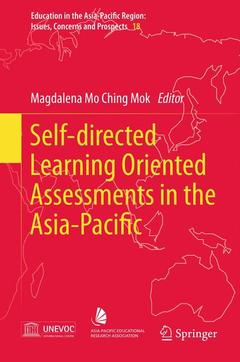Self-directed Learning Oriented Assessments in the Asia-Pacific, 2013 Education in the Asia-Pacific Region: Issues, Concerns and Prospects Series, Vol. 18
Coordonnateur : Mok Magdalena Mo Ching

The Asia-Pacific region needs to maximize the benefits of education to enable it to compete in an economic future dominated by innovation, in which assessing student progress must be an empowering rather than delimiting factor. This detailed exposition of the theoretical basis and application tools of self-directed learning-oriented assessment (SLOA) reflects the very latest research championed by the Assessment Research Centre at The Hong Kong Institute of Education. Featuring a range of relevant case studies, it explores the varied theoretical issues related to SLOA and offers an integrated view of the system fully in line with the constructivist paradigm of learning which advocates formative rather than summative assessment. Many of the initiatives outlined here are firsts in the region.
SLOA is already being applied in many schools with links to the ARC. It is an approach to assessment that acknowledges the centrality of self-directed learning and which positions assessment as a tool to enable and enhance self-directed learning. It draws on several theories of learning and assessment, including the constructivist notion that learning is best achieved when students take ownership of their educational process, setting their own goals and monitoring their own progress towards those goals. SLOA has been the research and service approach of the ARC since 2005. In the intervening years the centre has developed a number of tools to facilitate SLOA learning and assessment, including vertical ability scales, teacher-friendly computer software and packages for self-directed learning.
The combination of theory and practice provides a road map for enhancing learning outcomes in education institutions in the Asia-Pacific region
Shows how cutting-edge diagnostic assessment technology can be deployed to support learning and teaching
Outlines the successful and pioneering implementation of SLOA in classrooms in Thailand, Malaysia, China and Hong Kong
Date de parution : 11-2014
Ouvrage de 434 p.
15.5x23.5 cm
Disponible chez l'éditeur (délai d'approvisionnement : 15 jours).
Prix indicatif 158,24 €
Ajouter au panierDate de parution : 10-2012
Ouvrage de 434 p.
15.5x23.5 cm
Disponible chez l'éditeur (délai d'approvisionnement : 15 jours).
Prix indicatif 158,24 €
Ajouter au panierThème de Self-directed Learning Oriented Assessments in the... :
Mots-clés :
ARC; Assessment; Assessment Reform; Assessment Research Centre; Cognitive Diagnostic Assessment; Constructivist Paradigm of Learning; Diagnostic Assessment; Diagnostic Assessment Technology; Formative Assessment; Implementation of SLOA; Learning and Assessment; Peer Assessment; SLOA; Self Assessment; Self-directed Learning Oriented Assessment; Summative Assessment; Vertical Ability Scales; learning and instruction
